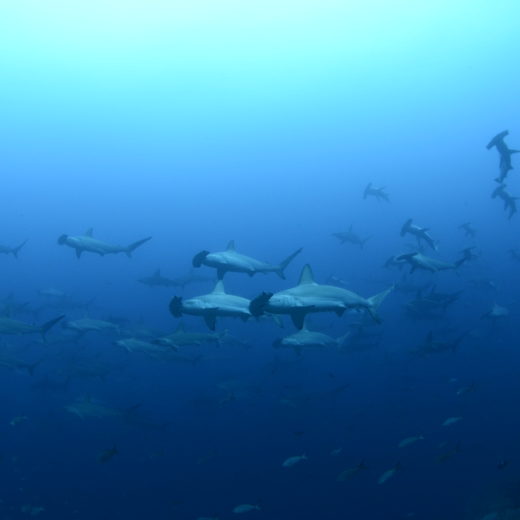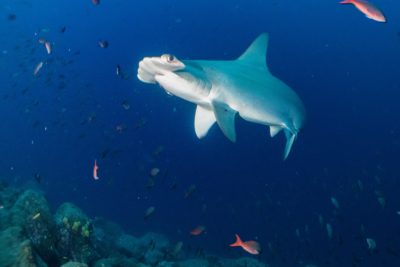
SANTA CRUZ, GALAPAGOS ISLANDS Ecuador – President of Ecuador, Guillermo Lasso today signed a historic Executive Decree to create a new marine reserve – ‘Reserva Marina de Hermandad’ to increase protection for one of the world’s most important marine ecosystems, the Galapagos Islands, home to nearly 3,000 marine species, 20 percent of which are found nowhere else on Earth. The expansion will create a massive new ocean corridor or ‘swimway’ of 60,000 sq km that will connect Ecuadorian waters with Costa Rican waters and significantly enhance protection for threatened migratory wildlife including humpback whales, sea turtles, giant manta rays, and endangered hammerhead sharks.
The ‘Reserva Marina de Hermandad’ includes 30,000 sq km where all extractive activities are prohibited (no-take zones) including critical ecosystem areas, migratory routes, and feeding areas for threatened marine species, and 30,000 sq km as a buffer zone where the use of long lines is prohibited. This new reserve increases the area of protection to nearly 200,000 sq km, when combined with the existing Galapagos Marine Reserve. It is also a key component of the newly announced mega-marine protected area known as the Eastern Tropical Pacific Marine Corridor (Corredor Marino del Pacífico Este – CMAR), which has recent commitments from the Presidents of Costa Rica, Panama, and Colombia to link the four countries Exclusive Economic Zones (EEZs) covering 500,000 sq km of protected waters.
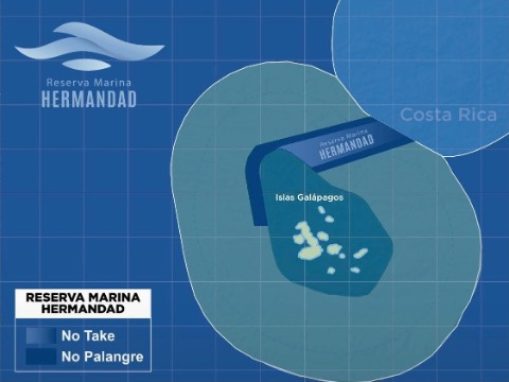

WildAid’s Marine Program has been working in the Galapagos for over 20 years improving marine enforcement operations systems and implementing a comprehensive marine protection plan with the Galapagos National Park. WildAid was instrumental in facilitating a partnership between the Ecuadorian Navy and the Galapagos National Park rangers to enforce GMR laws and to prevent illegal fishing and shark poaching within its borders. WildAid and its partners will be working to implement protection mechanisms and procedures that will be deployed across the new protected area, including state-of-the-art technologies to significantly enhance and improve control of the marine reserve.
WildAid President Peter Knights applauded the action, “It is essential that nations take bold actions to stem the tide of environmental degradation. President Lasso and Ecuador’s leadership for this historic decree is outstanding, and the collaboration of Costa Rica, Panama and Columbia to protect CMAR is vital and laudable. As we mark twenty years of our partnership with the Galapagos National Park Directorate to prevent illegal fishing, we are honored to continue to support what we believe is one of the best marine protection systems in the world.”
Despite the establishment of new global marine protected areas (MPAs) every year, many countries are ill-equipped and under-resourced to properly manage and enforce their MPAs. Often, the critical step from declaration to implementation falls short – resulting in limited conservation benefits and parks in name only or ‘paper parks’. WildAid’s Marine Program is working with government, nonprofit, and community partners around the world to strengthen the protection and enforcement of MPAs and coastal fisheries.
Manuel Bravo, Latin America Regional Director for WildAid Marine said, “These actions protect an area of incredibly high biodiversity, but also preserve the importance of connectivity between those regions. Wildlife that travels long distances in the open-ocean don’t care about boundaries on a map, and this expansion will help protect the unique and often threatened megafauna that migrate through these waters.”
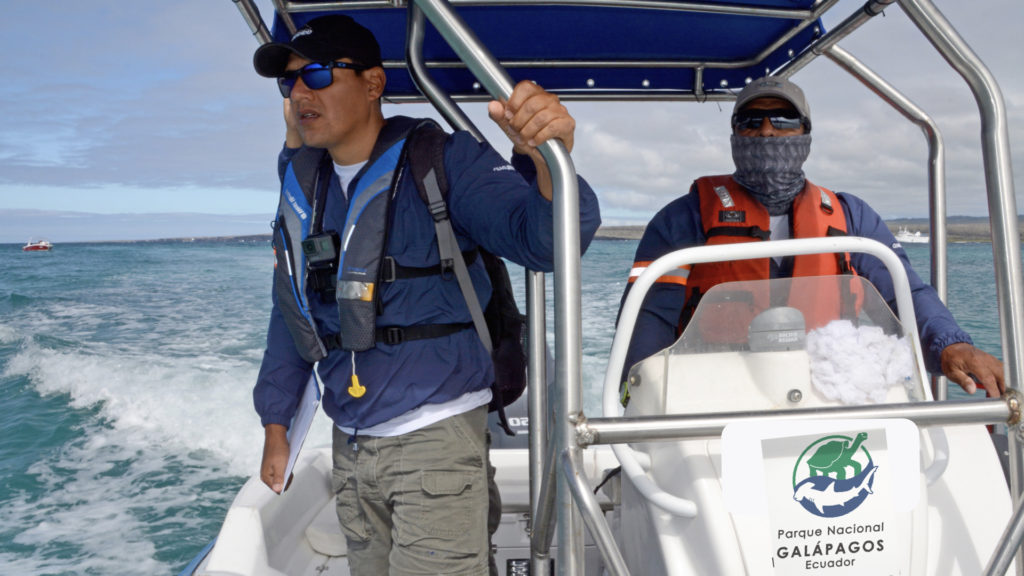

Today’s decree follows many months of dialogue with artisanal fishermen and the industrial fishing fleet, who agree on the importance of expanding this zone and the benefit ‘spillover’ of fisheries resources from increased fisheries production. The action is accompanied by an international financing structure of a debt-swap for nature conservation, to implement realistic management of the newly established boundaries.
“Most people don’t realize that nearly 60 percent of all marine protected areas lack effective enforcement. Our focus is on closing this gap. Starting in the Galapagos, we are creating ‘centers of excellence’ to share best practices and help partners prioritize smart and effective enforcement strategies and funding mechanisms.” said Meaghan Brosnan, Director of WildAid’s Marine Program. “In addition to our work in Ecuador, we are working with the governments of Panama and Costa Rica to help design marine protection systems, effective enforcement, and legislative strategies to ensure the long-term sustainability of these priority marine areas.
Not only is this important for threatened marine wildlife, but also to sustain essential economic drivers such as tourism, fishing, and maritime transport–which generates close to USD 3 billion annually. The leadership demonstrated by the Ecuadorian government sets the stage to help achieve the global goal of protecting 30 percent of the ocean by 2030.
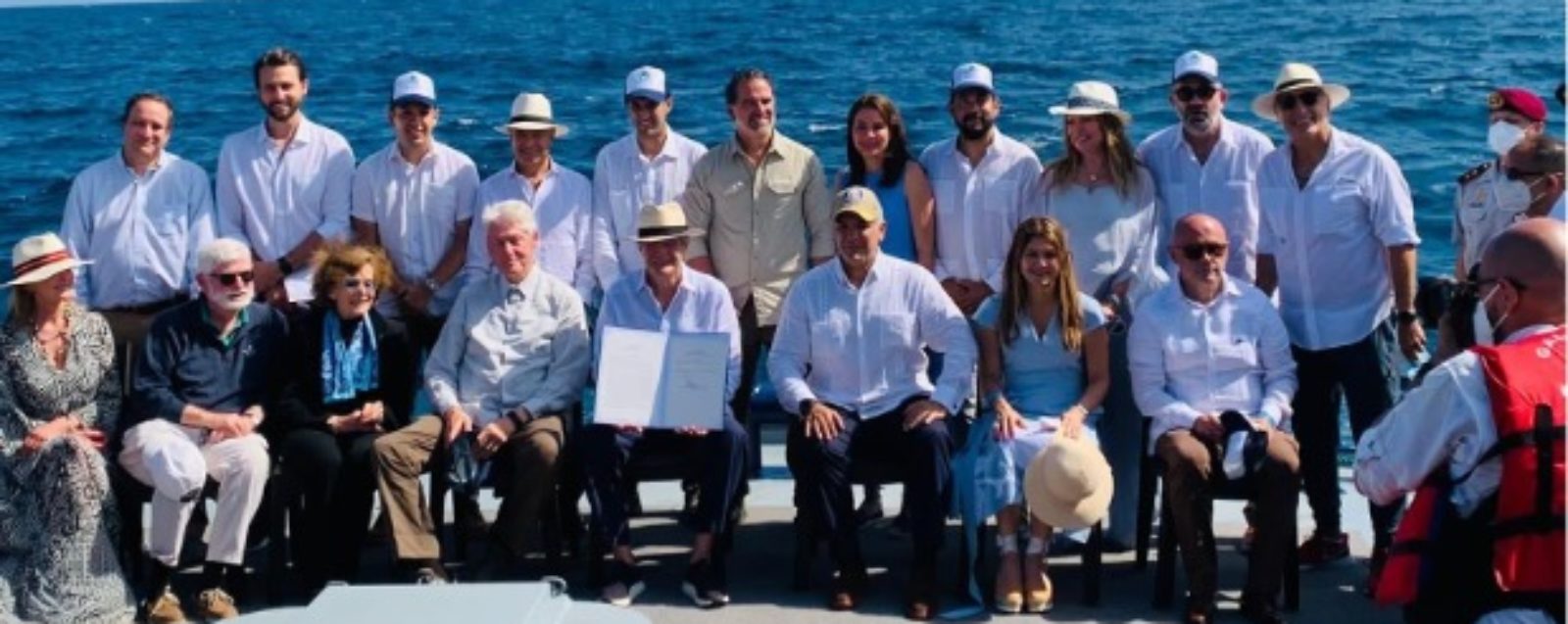

President Guillermo Lasso of Ecuador celebrates the designation of the ‘Reserva Marina de Hermandad’ with world leaders including Presidents Bill Clinton (United States) and Ivan Duque (Colombia), Gustavo Manrique (Ecuador’s Minister of Environment, Water, and Ecological Transition), ocean explorer Dr. Silvia Earle (Mission Blue), Yolanda Kakabadsen and other ambassadors. Photo credit @ Diego Anazco
Above: Galapagos Hammerhead with fishhook-Nov 2021 photo credit @Alan Chung
To learn more about WildAid Marine’s work in the Galapagos visit
https://marine.wildaid.org/projects/galapagos/
Links to WildAid Marine’s videos about the Galapagos. https://marine.wildaid.org/resources/
Stay in touch and get the latest WildAid updates.
SIGN UP
